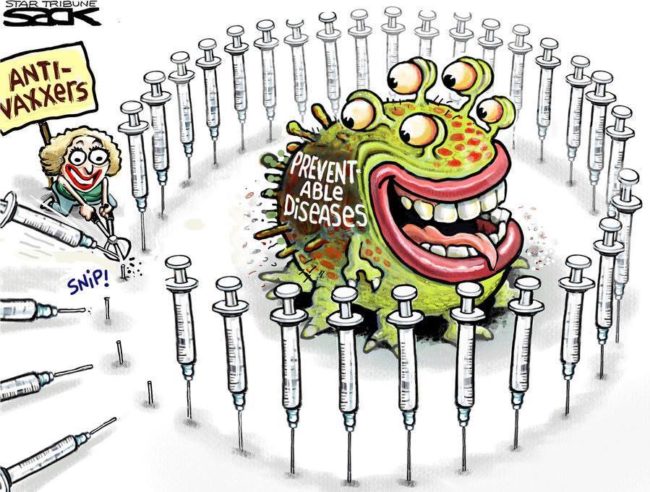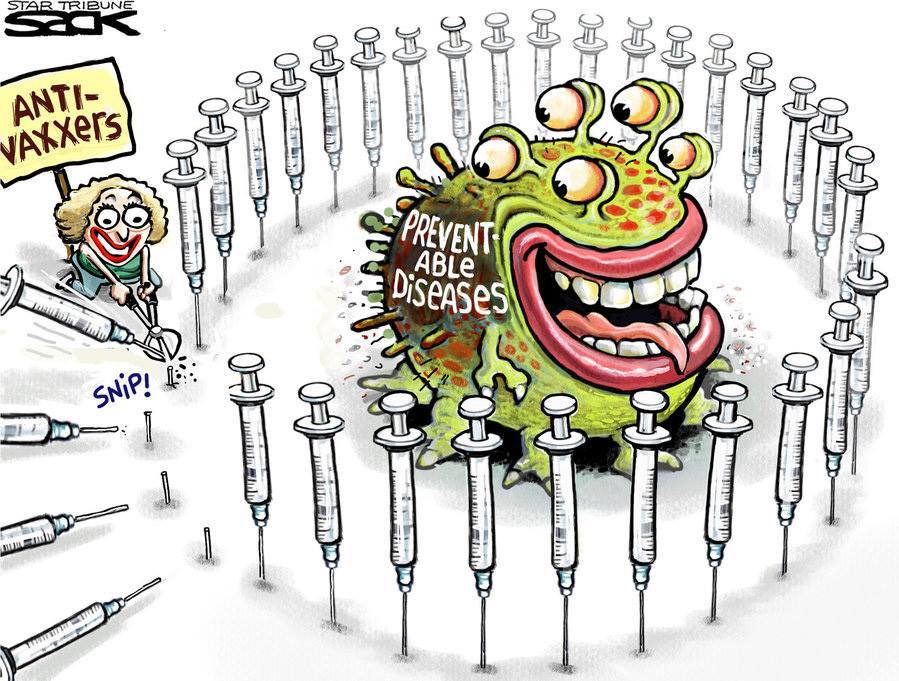
A couple of days ago Newsweek published a fabulous article titled “9 ANTI-VAXXER MYTHS DEBUNKED“. There they proceed to demolish these 9 myths …
- Vaccinations cause autism.
- Vaccines don’t really work.
- Vaccines contain toxins.
- Vaccines can overwhelm a baby’s immune system.
- Natural immunity is safer than vaccine-acquired immunity.
- There are effective natural and homeopathic alternatives to vaccines
- Good nutrition and hygiene will protect you from most viruses.
- Vaccines are just a way for doctors and pharmaceutical companies to make money.
- Vaccines aren’t necessary
I applaud them, I truly do. All of the above ideas are promoted by the anti-vaccine brigade, and non of them are true at all. The layout is also very good, take for example just one of them, the first. Here they expose you to the myth, then in effect immunise you against it …
Vaccinations cause autism.
Where the myth comes from: One of the most prominent claims of anti-vaxxers is that vaccines are linked to autism: A child on the autistic spectrum can be diagnosed as young as 12 to 18 months—around the same time the measles, mumps and rubella (MMR) vaccine is administered—leading some parents to assume a causal relationship. Most prominently, British gastroenterologist Andrew Wakefield published a shocking study in The Lancet in 1998 linking the MMR vaccine to autism and bowel disease.
The link between autism and vaccines is repeated often, including by celebrities like Jenny McCarthy, who told Oprah in 2007 that vaccines triggered her son’s autism, and President Donald Trump, who claimed in 2015 that after getting vaccinated, a child “got a tremendous fever, got very, very sick, [and] now is autistic.” A 2015 Pew poll found that one in ten parents believe the MMR vaccine is unsafe.
The facts: In 2004, the Sunday Times reported on financial conflicts of interest by Wakefield, who was allegedly planning to launch a company that would profit from the boom in medical tests and lawsuits that would follow his report. After it appeared his research was fraudulent Wakefield’s co-authors withdrew their support and his stuy was retracted by The Lancet. “The statements in the paper were utterly false,” editor Richard Horton told The Guardian, “I feel I was deceived.”
In 2009, a British administrative court ruled that “there is now no respectable body of opinion which supports the hypothesis, that MMR vaccine and autism and enterocolitis [a devastating intestinal disease affecting premature infants] are causally linked.” Wakefield’s medical license was revoked a year later.
Is what they are telling you True?
Yes it all is, you can verify this yourself. While the Newsweek article has no links, and that is perhaps a reflection of them being print media, the information is all out there.
I’ve written about it all in times past (with links to reliable sources) …
- April 2016 – Claim: Vaccines cause Autism
- Jan 2017 – Why is the reemergence Andrew Wakefield dangerous? – #vaccines
- Sep 2017 – The Impact of vaccines is profound – they really do work
- Jan 2019 – Vaccines: Who is making Fraudulent Claims?
If you are still struggling, there here are three solid facts …
- The MMR vaccine is safe, many tens of millions of doses have been administered worldwide, the data show no link between MMR and autism. As with any medicine there are occasional side effects, in some cases these might be serious, but the benefits far outweigh the slight risks.
- Single vaccines are less safe than MMR. They are less convenient, leading to poor uptake and more children being unprotected for longer; and they have had far less testing.
- Andrew Wakefield is about as discredited as it is possible for a doctor to get. He was found to have ordered invasive investigations on children without either the qualifications or authority to do so. He conducted research on nine children without Ethics Committee approval. He mismanaged funds, and accepted tens of thousands of pounds from lawyers attempting to discredit the MMR vaccine, being found by the GMC to have intentionally misled the Legal Aid Board in the process. He was not just dishonest, unprofessional and dangerous; his contempt for the rules and regulations that safeguard children in research projects was vile.
Why does this matter?
The reality today is that the anti-vaccine movement thrives and as a result people are dying. These utterly ignorant lunatics have a growing body count.
The Washington Post Reports (25th Feb) …
Anti-vaxxers face backlash as measles cases surge
…For the first time, the World Health Organization listed vaccine hesitancy as one of the top 10 global threats of 2019.
…Nearly 1,000 people, mostly children, have died of the illness in Madagascar this year, according to the WHO, offering a window into how rapidly the disease can devastate a country with low vaccination rates.
In Europe, measles cases are at a 20-year high, with 60,000 cases and 72 deaths. A quarter of those are in Italy, where anti-vaccine groups allied with populist politicians won passage last year of a law to end compulsory vaccines — a law repealed a short time later…
Social Media is playing a Role
Why is it now like this, what is going on?
Once again we are right back to the myth-information bubbles that people fall into on Social Media. After viewing one anti-vaccine clip, the algorithms select more of the same and keep on doing so. Exposed to clip after clip after clip of utter fiction presented as fact and no exposure at all to the fact-based rebuttals, convinces some to be concerned about vaccines and so deeply invest emotionally in the mythology.
While Flat Earth believers might be deemed to be harmless cranks, the anti-vaccine movement is a serious threat to public health, hence some of the social media platforms are starting to respond. But why have they acted on this issue?
Here is what has just happened.
BBC (25th February): YouTube takes ads off ‘anti-vax’ video channels …
The video-sharing site said it took the step because many of the anti-vaccine channels were promoting “harmful or dangerous ” views.
“Any misinformation on medical topics is especially concerning,” it said in a statement.
Alongside the decision to remove ads, it said it was also trying to make “more authoritative content” easier to find on the benefits of vaccination and was also stopping anti-vaccine videos appearing in recommendation lists.
It was also planning to create “information panels” on pages that listed sources where people can fact-check information for themselves.
It said: “Like many algorithmic changes, these efforts will be gradual and will get more and more accurate over time.”
That’s rather an unusual step for them to take, so back to my question, why did they act?
BuzzFeed reporting on 22nd February has the details. It is a response triggered by an advertiser revolt …
… Nomad Health, a health tech company, told BuzzFeed News that it “does not support the anti-vaccination movement,” was “not aware of our ads running alongside anti-vaccination videos,” and would “take action to prevent it from happening in the future.”…
…“We will continue to remain off of the platform until those changes are made and are proven to be effective by other advertisers,” the Vitacost spokesperson said…
… “Upon learning of this, we immediately contacted YouTube to pull our ads from appearing not only on this channel but also to ensure related content that promulgates conspiracy theories is completely excluded,” said a spokesperson for Grammarly, a writing software company. “We have stringent exclusion filters in place with YouTube that we believed would exclude such channels. We’ve asked YouTube to ensure this does not happen again.”…
… Other companies that asked YouTube to stop their ads from appearing alongside anti-vax content include:
-
Brilliant Earth, a jewelry company, which said it has “made internal adjustments to our ad settings and will also follow up with our advertising partners to prevent our ads from appearing next to this content.”
-
CWCBExpo, a marijuana trade show, which said it would be “implementing strict guidelines on content placement and is eliminating hundreds of YouTube channels/videos and negative keywords.”
-
XTIVIA, which said it was “reviewing the ad placement,” which was “not [its] requested target.”
-
SolarWinds, a software company, which said the placement was unintentional and that it had “adjusted [its] filters to further refine the targeting of our ads on YouTube to better align with our targeted audience, MSPs and technology professionals.”
This has forced YouTube to take meaningful decisive action and to stop promoting utter crap. They have not acted out of the goodness of their hearts, but instead have responded to stem a financial impact.
Money talks.
It’s not just YouTube
Pinterest has blocked all searches on vaccinations to stop the spread of misinformation.
There has also been a political response
Following a measles outbreak, US Rep. Adam Schiff demanded last week that Facebook and Google, which owns YouTube, address the risks of the spread of medical misinformation about vaccines on their platforms. Facebook responded last week by saying it would take “steps to reduce the distribution of health-related misinformation on Facebook.”
One Last Thought
Nothing about any of this a storm in a teacup. It is a very serious issue.
I’ll simply drop this extract from the Telegraph (25th February 2019) and leave you to ponder over it …
… Few represent Madagascar’s tragedy more than Hasina Raharimandimby. Over three successive days in late January, three of her four children died of measles.
She had tried to get them vaccinated at her local clinic well before they became sick, but there were no vaccines to be had, she told CNN.
The epidemic has been particularly devastating for infants. Babies aged nine months and below account for 84 per cent of the deaths confirmed so far. Nearly all the rest of the mortalities have been of school-going children.
Madagascar’s epidemic is a warning of what could happen elsewhere, even in the rich world, if measles vaccinations rates do not rise. Global coverage has stalled at 85 per cent in recent years, well short of herd-protection levels. …
… Measles, which once killed 2.6m people a year before a vaccine developed in the 1960s began to make a difference, is again on the rise….
Further Reading
- Newsweek (28th February 2019): 9 ANTI-VAXXER MYTHS DEBUNKED
- Washington Post (25th February 2019): Anti-vaxxers face backlash as measles cases surge
- BBC (25th February 2019): YouTube takes ads off ‘anti-vax’ video channels
- Telegraph (20th Feb 2019): Clamour for vaccines as measles outbreak kills nearly 1,000 children in Madagascar
- BuzzFeed (22nd February 2019): YouTube Just Demonetized Anti-Vax Channels
